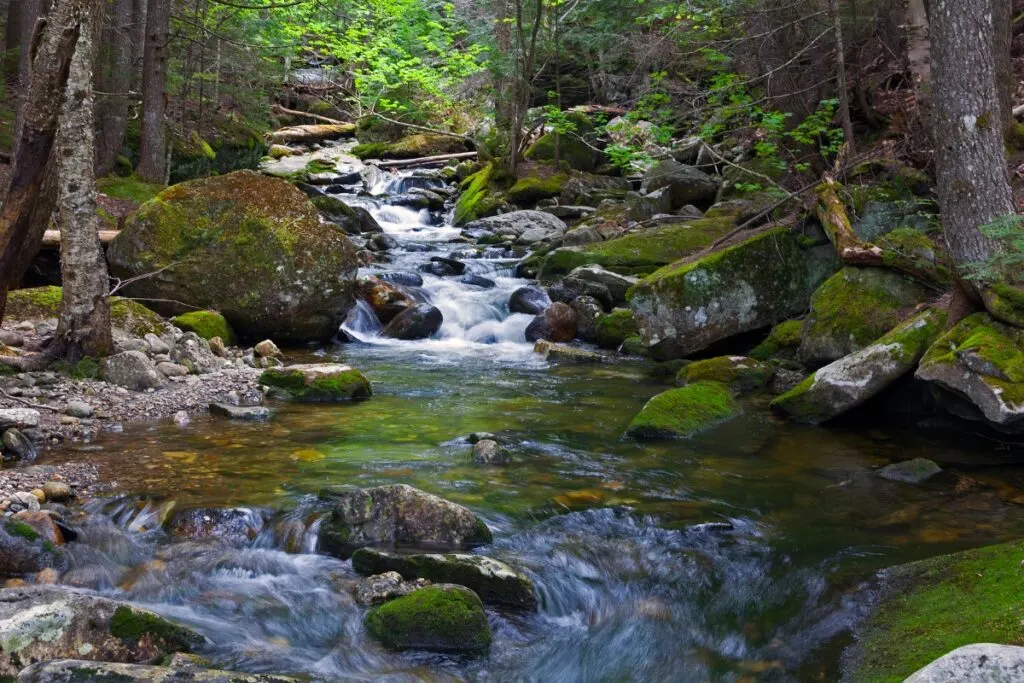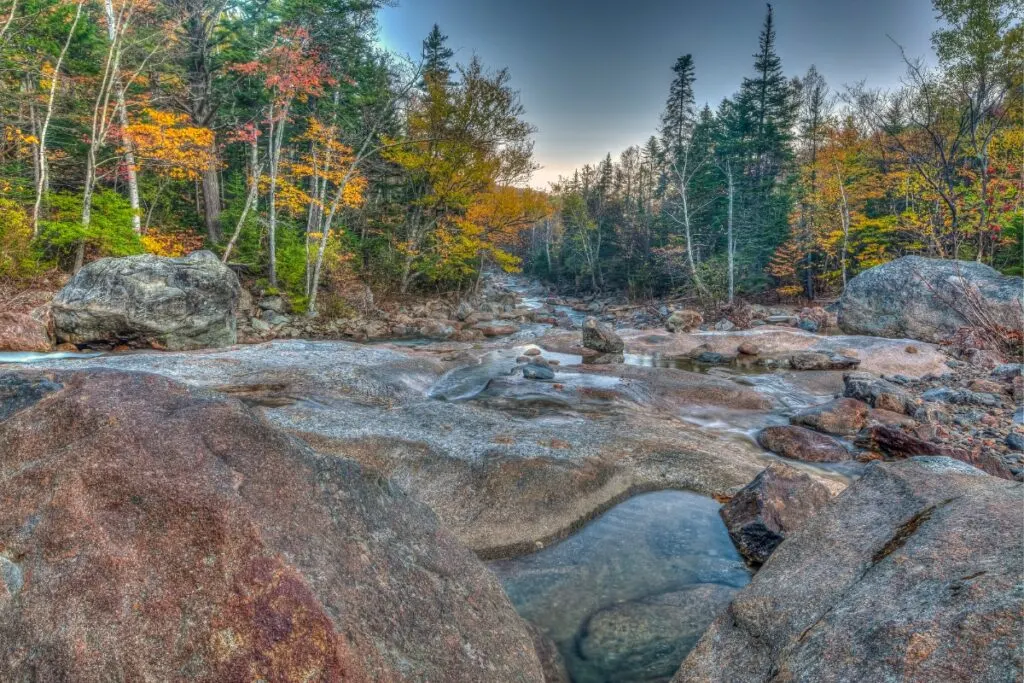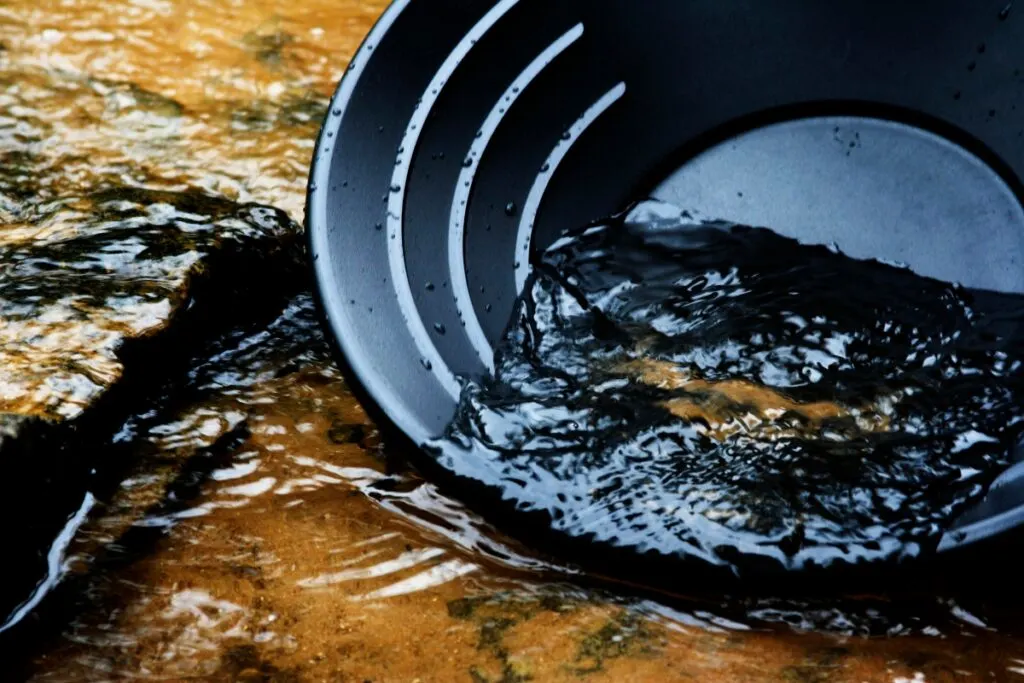As an Amazon Associate, I earn from qualifying purchases with no additional costs for you.
Gold prospecting in New Hampshire is as unique as the state’s breathtaking landscapes. It is a venture steeped in anticipation, where the unexpected often becomes the rule rather than the exception. It’s a journey of peaks and troughs, where every nugget discovered is a puzzle piece to an ever-evolving geological narrative.
The best gold prospecting locations in New Hampshire are:
- Swift River
- Wild Ammonoosuc River
- Indian Stream
- Pemigewasset River
- Baker River
- Merrimack River
- Diamond Ledge
In this article, we’ll dive into the art of gold panning in New Hampshire, revealing seven of the best spots to search for this precious metal and the legal aspects of gold prospecting, ensuring your treasure hunt is fun and law-abiding with Gold opportunities.

If you want to check out the best tools and equipment for gold prospecting, you can find them by clicking here (Amazon link).
The Legality of Gold Prospecting in New Hamshire
New Hampshire’s gold prospecting laws pivot on a delicate balance between individual freedom, economic considerations, and environmental conservation. Public lands, including state parks, forests, and wildlife management areas, are generally off-limits for gold prospecting activities.
However, areas classified as “unreserved, unappropriated lands” and certain water bodies hold the promise of a golden quest, albeit with some regulatory caveats.
Gold prospecting also overlaps with land rights. Private lands are a different ball game, where property rights reign supreme. Without the express permission of landowners, your golden dream can quickly become a legal nightmare.
When you thought the plot couldn’t thicken any further, enter federal law. Because of the complex nature of land ownership and stewardship in the US, some lands in New Hampshire are under federal jurisdiction, meaning that federal regulations, like those of the Bureau of Land Management, come into play.
7 Best Places to Find Gold in New Hampshire
New Hampshire’s diverse terrain offers many opportunities for gold prospecting enthusiasts. Here are the top 7 best places to find gold in New Hampshire:
Swift River
The Swift River, located in the White Mountain National Forest, offers a serene setting for panning. It’s particularly popular with amateur prospectors, so you might even make a few friends while hunting for that elusive gold dust.
The Swift River is a favored spot for gold panning. The river’s flow carries fine gold flakes from the hills, depositing them in gravel bars and river banks. All you need is a pan, patience, and maybe a lucky charm!
Wild Ammonoosuc River
The Wild Ammonoosuc River, around Bath, is famous among prospectors. Gold was first discovered here in the 1860s, and prospectors have been panning its waters ever since. The western segment, near the towns of Bath and Woodsville, is especially known for its gold yield.
So, if you’re seeking a riverside adventure with a chance of striking it rich, “The Ammo” is your go-to spot! Many attest to finding gold nuggets and flakes here.
The river also provides breathtaking views, making your prospecting adventure doubly rewarding. This river is a hot spot for recreational gold panners.
TIP: Find out my recommended products if you are looking for the best tools you need to find gold (Amazon link):
- Gold Metal Detector: Bounty Hunter TK4 Tracker
- Gold Pan: Stansport Deluxe Gold Pan
- Sluice Box: Stansport Aluminum Sluice Box
- Shovel: Radius Garden Carbon Steel Shovel
- Snuffer Bottle: Stansport Snuffer Bottle
Indian Stream
The Indian Stream, Nestled in the northernmost part of the state, Indian Stream is a lesser-known but equally rewarding gold-finding location.
The stream’s surrounding areas were the site of a minor gold rush in the 1860s, and the gold remnants are still there, waiting for lucky prospectors.
In the Great North Woods region, Indian Stream is a lesser-known gold panning spot. It may not be as popular as the others, but many have found gold in its icy-cold waters. It’s worth a visit if you are looking for a bit of solitude with your treasure hunt.
Pemigewasset River
The Pemigewasset River, Located near Franconia Notch State Park, Pemigewasset River offers an enticing mix of recreational activities and gold panning. Whether you find gold or not, the striking beauty of the place is sure to captivate you.
The Pemigewasset carries more than just water through Plymouth. You might get lucky with the elusive yellow metal when panning along its banks.
With its origins in the White Mountains, the “Pemi” has carried gold down to the lowlands for centuries. As a bonus, its beautiful surrounding landscapes make the search for gold even more enjoyable.
TIP: New Hampshire is a curious little state where rockhounds often wonder if they have any places to visit or what specimens they can find. Check out the complete Delaware rockhounding guide in the article below:
GUIDE: Best Rockhounding in New Hampshire & What Rocks Find
Baker River
The Baker River in the western part of New Hampshire has a rich history of gold discoveries. Placer gold can be found in nearly every river aspect, making it a gold panner’s delight.
The Baker River flowing through the small town of Warren is a gold prospector’s delight. The river’s gravel bars are often generously sprinkled with gold, particularly after heavy rain.
Offers decent opportunities for gold prospecting. The gold found here is typically fine, but don’t let that deter you. You could strike it lucky with the right equipment and a keen eye.
Merrimack River
The Merrimack River Boscawen’s section of the Merrimack River is known for its fine placer gold. Remember to bring a sluice box and your gold pan to maximize your chances of finding something special.
This broad river that winds through the southern part of the state has been known to bear gold. Try your luck near bedrock cracks or natural riffles where gold, being heavy, might settle.
The Merrimack River carries the whispers of the state’s industrial past and, with some luck, the glint of gold in your pan.
Diamond Ledge
The name ‘Diamond Ledge‘ might seem like a misdirection, but this place is known for more than its quartz deposits. Some gold panners have reported finding gold here, too, embedded within quartz veins.
So, if you’re in Sandwich, don’t just enjoy the lovely town but also explore Diamond Ledge’s rugged beauty and prospecting potential.
Diamond Ledge in Ossipee is renowned for its mineral deposits. Apart from quartz and mica, gold has been discovered here as well. Who knows? You might find more than just gold at this rocky haven.
TIP: Simple gold panning is among the most allowed gold prospecting techniques you can use almost anywhere. Check out other effective methods in the article below:
The 7 Most Effective Gold Prospecting Techniques Explained
Active, Old & Abandoned Mines
These mines provide unique opportunities for gold prospectors and insight into New Hampshire’s rich mining history. Read on let’s explore notable mines throughout New Hampshire and identify their current status.
Beaver Brook Mine (Active)
The Beaver Brook Mine in Lisbon continues to carry the mantle of New Hampshire’s mining tradition. It stands as the largest known anthophyllite asbestos deposit in the country.
It operates as a significant source of lump talc in the United States, contributing to industries ranging from ceramics to paint.
Ruggles Mine (Old)
The Ruggles Mine, Perched in Grafton, was once an active mining site for mica, a mineral indispensable to electrical and heat insulation industries. A commercial operation until 1960, it later served as a tourist attraction for decades, its sprawling mine tunnels drawing enthusiasts from far and wide.
A trip to Ruggles Mine today would reveal a touristic site rather than a working mine. Its 235-acre expanse is now a family-friendly destination where visitors can still find mica glittering in the sunlight.
Though mining activities have ceased, Ruggles remains an iconic landmark in New Hampshire’s mining history.
Palermo Mine (lnactive)
The Palermo Mine In North Groton was a major source of lithium, a versatile element with numerous applications, from batteries to mental health treatments. Operational from 1942 to 1973, Palermo was the nation’s only producer of lithium during World War II.
Today, the mine is no longer active. Still, it’s renowned in the mineralogical community as a source of more than 150 different mineral species, a prominent source of lead, copper, and a variety of significant rare-earth minerals.
Its diverse mineralogy has made it a magnet for collectors and geologists. It retains a spectral presence in New Hampshire’s mining chronicle. It remains an important study site for geologists.
TIP: Starting your gold prospecting journey depends on your seriousness and knowledge. Check out the ultimate guide on starting gold prospecting in the article below:
Ultimate Beginner’s Guide: How To Start Gold Prospecting
Gold Prospecting Clubs in New Hampshire

This section explore on the major gold prospecting clubs in New Hampshire, as you read further, you’ll gain access to valuable resources, meet fellow prospectors, and have the opportunity to explore and prospect in some of the state’s most gold-rich areas. Here are some gold prospecting clubs in New Hampshire.
New Hampshire Gold Prospectors Association (NHGPA)
The New Hampshire, Gold Prospectors Association, is An organization that can boast a lineage back to the Gold Rush days; the NHGPA is an old hand in this treasure hunt.
Known for its welcoming, inclusive atmosphere, the NHGPA offers a bounty of knowledge and resources for newcomers and seasoned prospectors alike.
They organize regular panning outings and instructional workshops and have even brought in guest speakers to share their wisdom.
Not only do they offer members opportunities to try their luck in the riverbeds, but they also advocate for environmental stewardship and respect for private property.
Central New Hampshire Prospectors (CNHP)
The Central New Hampshire Prospectors is another shining star on New Hampshire’s prospecting scene.
Focusing primarily on the state’s central regions, they not only serve up opportunities for gold prospecting but also the chance to seek out other minerals and gems.
CNHP promotes responsible mining while cultivating an environment for gold seekers to learn, connect, and, most importantly, have fun!
The CNHP organizes monthly meetings and regular outings, allowing members to hone their prospecting skills. Members are also privileged to prospecting classes, educational materials, and a chance to connect with experienced.
Their dedicated members regularly organize field trips, allowing novices to learn from experienced prospectors. Membership includes access to exclusive claims where that elusive gold may be hiding.
Gold Prospectors Association of America (GPAA)
The Gold Prospectors Association of America, Established in 1968, the GPAA is a national organization with a notable presence in New Hampshire.
Offering a platform for experienced miners and greenhorn prospectors, this organization fosters a vibrant community centered on the golden pursuit.
With an annual membership, you can access mining guides, GPAA claims nationwide, and a Gold Prospectors Magazine subscription.
The best part? The Regular meetings, gold shows, and outings allow members to share tips, tricks, and tales of glittering finds.
TIP: Nothing in this world is impossible, and finding gold in your backyard is rare but can never be ruled out. Find out helpful tips in the article below:
Guide: PRO Tips On How to Find MORE Gold in Your Backyard
Gold Panning Tours in New Hampshire
Gold panning tours are a unique opportunity for visitors and residents to experience the excitement of prospecting for gold while learning about the state’s rich mining history. Here are some gold panning tours in New Hampshire:
Swift River Gold Panning
The Swift River Gold Panning, Out in the White Mountains, the Swift River is famed for its rich gold reserves, with stories dating back to the gold rush era. Here, you can join gold panning tours that offer guidance for beginners and challenges for the experienced.
The spectacular natural beauty that surrounds you only enhances the thrill of discovery. While not a formal tour, Swift River is a popular destination for amateur gold prospectors.
It’s recognized for its gold deposits. With its free and public access, it presents a fantastic opportunity for those willing to
American Gold Prospecting Adventures
The American Gold Prospecting Adventures is located in Auburn, New Hampshire. Their guided tours teach you the art of gold panning and offer insights into gold’s geological formation and the state’s mining history.
If you’ve ever wondered what it’s like to be a gold prospector, your dream could become a reality at American Gold Prospecting Adventures; they offer a thrilling, hands-on experience where you’ll learn to pan and sluice for gold using actual prospecting equipment. The best part? Anything you find is yours to keep.
Ammonoosuc River Gold Panning
The Ammonoosuc River Gold Panning, flowing through picturesque landscapes and historical gold-producing regions, provides another excellent spot for panning. Joining a gold panning tour here offers a unique mix of exploration, education, and the prospect of unearthing hidden treasures.
Ammonoosuc River has a lustrous history of gold discovery dating back to the 19th century. The river, with its serene, scenic beauty, offers an exciting day of gold panning and an escape into nature.
Guided by seasoned gold prospectors, participants get hands-on experience panning in the river. You’ll learn the ins and outs of gold prospecting, from spotting promising locations to mastering the “swirl and tap” method.
This tour sets itself apart by providing all the necessary equipment and guidance for an authentic gold panning experience.
TIP: The gold sluice box is a time-saving alternative to the traditional panning for gold. Check out helpful tips on using the sluice box correctly in the article below:
Find More Gold: Tips On How To Use Sluice Box Properly
Gold Prospecting Law: ls Gold Panning Legal in New Hampshire?

These laws are in place to ensure that gold prospecting activities are conducted responsibly and do not cause harm to the environment or infringe on the rights of private property owners. Here’s what you need to know about gold prospecting laws:
Legal Landscape of Gold Panning in New Hampshire
Yes, gold panning is legal in New Hampshire. But as with everything in life, certain conditions and stipulations apply. You can’t just wander the wilderness with a pan and start digging.
The state has a set of rules in place to protect both the land and the individual rights of the people who own it.
Though gold panning is generally permitted, understanding the intricacies of these regulations is critical. For instance, prospectors need to know that any gold found cannot be commercially sold without a permit.
State-Level Regulations
Like many states, New Hampshire has rules and regulations regarding gold prospecting. These laws aim to balance the rich history and allure of gold prospecting with the need to protect the environment and respect property rights.
Generally, panning for gold in New Hampshire is legal, provided one adheres to the state’s specific rules and guidelines.
Prospecting is allowed on most public lands, provided it’s done in a non-destructive manner. It should not harm or disturb wildlife, vegetation, or the landscape. Gold panning falls under this provision, as it’s generally considered a non-invasive prospecting method.
Public vs. Private Land
It’s vital to distinguish between prospecting on public versus private land. The majority of public lands are open to recreational gold prospecting.
However, if the area is privately owned, one must seek the landowner’s explicit permission before prospecting. Trespassing on private property to pay for gold can have severe legal consequences.
Understanding Property Rights
Property rights are the main considerations you must respect while prospecting for gold. In New Hampshire, you must have the explicit permission of the landowner before you start panning on private land. This is non-negotiable. It’s not only a matter of courtesy; it’s the law.
There are important limitations that prospective gold panners should be aware of. Panning is generally prohibited in national parks, monuments, and certain protected areas.
Furthermore, you need permission from the landowner if you wish to pan on private land. Always verify the specific regulations of the site you plan to visit.
Public Lands and Rivers
On public lands, the situation is a bit different. New Hampshire does permit recreational gold panning on its public lands, but the law mandates that you do it in a way that doesn’t disrupt the ecosystem or infringe on the rights of others.
This usually means panning in designated areas and following the “leave no trace” principle.
Consequences of Unlawful Prospecting
While gold panning might seem romantic, one must recognize the potential legal consequences of not following the rules.
Fines, penalties, and even criminal charges can result from unlawful prospecting. The law protects everyone and ensures we can all enjoy the land and rivers for generations to come.
TIP: Gold panning is legal in the U.S. however, you must remember that every state has gold panning laws. Find out the complete guide on gold panning law in the article below:
Complete Guide: Is Gold Panning Legal & Where Can You Pan?
Tips on Getting a Gold Claim in New Hampshire
Securing a gold claim in New Hampshire can be exciting and rewarding, allowing you to prospect for gold on your land. Here are some tips to help you get started:
Gold Claims
The gold claim is a parcel of land where you have the exclusive right to prospect and mine for gold. It’s not a guarantee that you’ll find gold, but it is where you’re legally allowed to look.
Research
Get familiar with New Hampshire’s geology. Where there’s quartz, there’s often gold. Most of New Hampshire’s gold comes from small lode deposits within quartz veins. Addiitionaly, placer gold, formed by the weathering of these veins, can be found in the state’s streams and rivers.
The granite state may not be the first place that comes to mind when you think of gold, but that doesn’t mean there aren’t treasures to be discovered. Gold has historically been found in the Ammonoosuc, Wild Ammonoosuc, and Indian Stream. These are potential areas for you to stake your claim.
Gold Prospecting Laws
New Hampshire has laws to protect both claim owners and the environment. Familiarize yourself with the New Hampshire Department of Environmental Services and the Bureau of Land Management regulations. It’s important to respect property rights.
Always seek permission from landowners before prospecting on private property. On public lands, certain rules and restrictions apply. For example, mechanized equipment is generally prohibited.
The Claim Process
To get a claim, you need to locate a piece of land where gold has been found before or where you believe gold might be present. Then, you’ll need to follow the legal process to stake your claim.
Land Status Research
Before staking a claim, research the land status to ensure it is open to mineral entry and not already claimed. You can do this by contacting the New Hampshire Bureau of Trails or using the Bureau of Land Management’s LR2000 system online.
Staking Your Claim
Once you’ve identified the land, you need to stake your claim physically. This involves marking the boundaries of your claim and creating a Notice of Location.
Filing Your Claim
The next step is to file your claim with the County Recorder’s Office and pay the required fees. You must also file with the Bureau of Land Management in New Hampshire.
To file a gold claim, you need to identify the land and verify that it’s open for claiming. Once you’ve confirmed this, you can complete the appropriate forms and submit them, along with the required fee, to the Bureau of Land Management.
Maintaining Your Gold Claim
Owning a claim is an ongoing responsibility. There are certain duties you must fulfill to keep your claim valid.
Each year, you must perform a certain amount of work or improvements on your claim or pay a fee-in-lieu for completing the work. It’s crucial to document all your activities and progress. This will help protect your suit from challenges.
Respect the Environment
Remember, while searching for gold, you’re also a guest in New Hampshire’s beautiful wilderness. Leave no trace, respect wildlife, and always follow local regulations.
TIP: Find out my recommended products if you are looking for the best tools you need to find gold (Amazon link):
- Gold Metal Detector: Bounty Hunter TK4 Tracker
- Gold Pan: Stansport Deluxe Gold Pan
- Sluice Box: Stansport Aluminum Sluice Box
- Shovel: Radius Garden Carbon Steel Shovel
- Snuffer Bottle: Stansport Snuffer Bottle
Wrapping Up
Gold prospecting is an exciting and potentially rewarding hobby; your venture into New Hampshire’s golden landscape should be a thrilling experience; the journey is as important as the destination.
Remember, striking gold requires patience, perseverance, and a bit of old-fashioned luck. Happy prospecting!
TIP: You need to know how gold deposits occur to understand which rocks to look for when prospecting. Find out more in the article below:
5 Rocks You Need To Look For When Gold Prospecting (+ Why)
